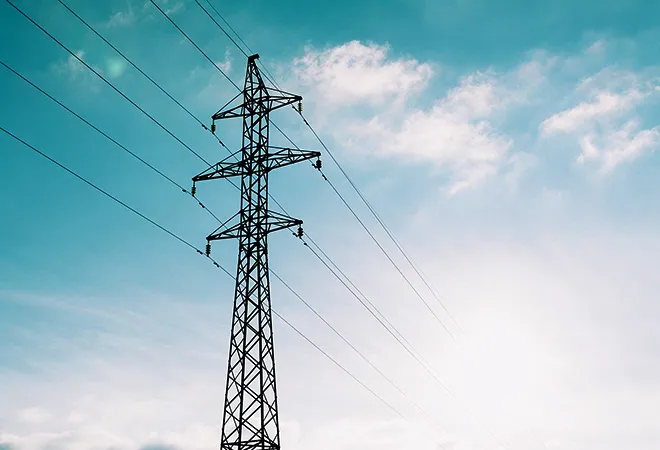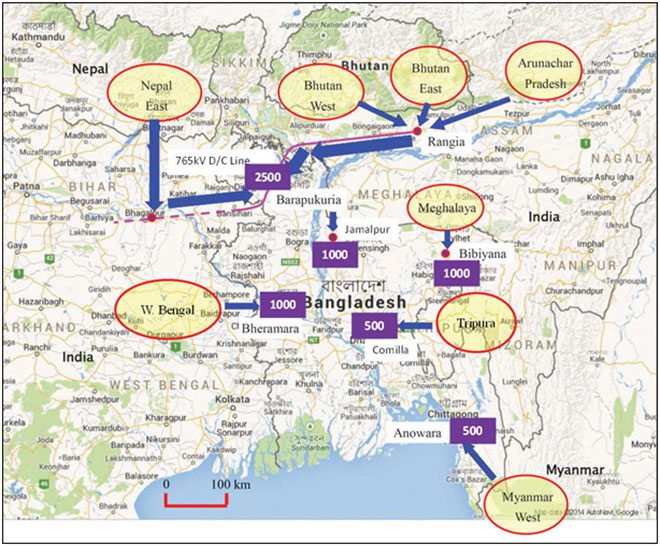 This article is part of the series — Post-Pandemic Development Priorities.
This article is part of the series — Post-Pandemic Development Priorities.
The Sustainable Development Goal (SDG) 7 aims to ensure universal access to energy, increased energy efficiency and expanded use of renewable energy through new economic opportunities and jobs by 2030 through well planned, strategic, intergovernmental and time-bound actions. With the motto “leave no one behind,” it seeks to close the electricity access gap and also intends to strengthen inter-linkages between SDG 7 and other SDGs. For the sake of its agenda, SDG 7 encourages cross-border grid connections, on-grid renewable energy solutions and decentralised options that are required to respond to the differing needs of countries and regions.
Indeed, billions of people worldwide are benefited from SDG 7. Hence, it is imperative to review the situation in the Bay of Bengal region, where the electricity demand and supply gap is negative and is expected to grow over the period by 2030. Under the circumstances, is there any scope for cross-border grid connection in this region to meet this increasing demand? What are the constraints, if any, in achieving the aims of SDG 7? This brief essay will focus only on conventional energy with special attention to access to electricity.
BIMSTEC at a glance
Rapid economic growth, industrialisation and increasing demand for goods and services has led to a rising trend in primary energy consumption per capita in all BIMSTEC countries namely, Bangladesh, Bhutan, India, Nepal, Sri Lanka, Thailand and Myanmar. As per the BIMSTEC Energy Outlook 2030 the total primary energy supply in the BIMSTEC region in 2008 was 772 millions tonnes of oil equivalent (Mtoe), which is estimated to increase to 1758 Mtoe by 2030. During the same period, the total primary energy consumption was 539 Mtoe in 2008 and estimated to increase to 1210 Mtoe in 2030. Coal continues to remain the primary source of energy supply. The share of oil in total primary energy consumption is expected to decline from 31 percent in 2008 to 29 percent in 2030; it nonetheless accounts for the largest share which is closely followed by an increase in the consumption of electricity from 13 percent in 2008 to 20 percent in 2030.
Most of the BIMSTEC countries are dependent upon imports to meet their primary energy needs — India’s import dependency was 41.5 % in 2018, Bangladesh was 16.8 % in 2014, Nepal was 16.7% in 2014, Sri Lanka was 57.5 % in 2017 and Thailand was 64 % during December 2018-19. Nonetheless, the fact remains that despite being dependent upon external sources for energy requirements, the BIMSTEC region itself is endowed with abundant natural resources comprising of coal at 324 billion tonnes, oil at 664 million tonnes, natural gas at 99 trillion cubic feet, biomass at 11 billion tonnes, hydropower (large) at 328 GW, and renewable energy potential of more than 1,000 GW.
Increasing cross-border trade in electricity will be an important component of an integrated strategy aimed towards ensuring energy security in the region.
The per capita electricity consumption in the region is still abysmally low though most of the BIMSTEC countries have made significant improvements in ensuring access to electricity. Except for Bhutan, the per capita electricity consumption of all the other BIMSTEC countries is below the world average of 3501 kWh/capita in 2019. The situation of the Bay region is stark in comparison to major global economies like the United States (13,375 kWh/capita), Australia (10,519 kWh/capita), France (8,835 kWh/capita) and United Kingdom (4,794 kWh/capita). Nepal accounts for very low consumption (177 kWh) while Bhutan has more than 9,000 kWh, Myanmar 442 kWh, Bangladesh 550 kWh, Sri Lanka 759 kWh and India 1,141 kWh in 2019. The BIMSTEC countries, therefore, must tap into the resources available within the region to ensure energy security. The share of electricity in primary energy consumption will increase in the near future, but supply will remain inadequate. Increasing cross-border trade in electricity will, therefore, be an important component of an integrated strategy aimed towards ensuring energy security in the region.
Cross-border energy cooperation within BIMSTEC: Some pressing issues
The first BIMSTEC Ministerial Conference on Energy was held in New Delhi, India, in 2005 where the “Plan of Action for Energy Cooperation in BIMSTEC” was formulated. Further, a MoU has been signed on BIMSTEC Grid-Interconnection by the member countries in 2018. BIMSTEC Grid Interconnection aims to expand energy trade among member states and accelerate development of new hydro-power projects, interconnection of electricity and natural gas grids, implementation of viable renewable energy projects, and sharing of experiences, knowledge and information on energy efficiency programmes. The experts argue that cross-border electricity network will not only ensure quality supply of power at a lower cost, but also enhance energy efficiency. However, resource scarcity has become one of the major concerns in this regard.
Cross-Border Sub-Regional Energy Trade Possibility
 Source: M.Hossain, Open Borders, Power Line, May 2019.
Source: M.Hossain, Open Borders, Power Line, May 2019.
It is worth-noting, energy cooperation in the BIMSTEC region has been evolved through bilateral arrangements, with India being the central figure because of its geographical location and large economy. The bilateral arrangements between India-Bhutan, India-Bangladesh and India-Nepal are well established now where the contiguous zone comprising of Bangladesh, Bhutan, India and Nepal (BBIN) may emerge as a hub of energy resources for the BIMSTEC. In this regard, India’s national policy on cross-border electricity trade (CEBT) assumes central importance. The first draft of the guidelines on CBET issued in 2016 was opposed by Bhutan and Nepal on the grounds that electricity could only be exported to India by companies that were owned by the respective governments of these countries or by those having at least 51 percent equity investment of Indian public or private companies after obtaining a one-time approval from the designated authority. Under the amended guidelines issued in 2018, these restrictions were removed although exports (imports) were still subject to generation capacity exceeding (falling short) of demand.
The bilateral arrangements between India-Bhutan, India-Bangladesh and India-Nepal are well established now where the contiguous zone comprising of Bangladesh, Bhutan, India and Nepal (BBIN) may emerge as a hub of energy resources for the BIMSTEC.
Consequentially, cross-border multilateral efforts are yet to develop. The time has come to critically evaluate the factors that have hindered progress along this path so far. Too much dependency on bilateralism sometimes creates obstacle to promote cross-border multilateral cooperation. The inherent link between energy and electoral politics in the BIMSTEC region in general and BBIN in particular has led to the perception of energy as a political good rather than an economic good, which can change the situation for the betterment of the common people across the border. The political labelling of energy has led to the failure to account for the economic cost of non-cooperation. More so, keeping a balance between environmental concerns and developmental activities sometimes appears as a serious challenge. Mutual political understanding and good will is the need of the hour to implement SDG 7 goals for ensuring energy for all. Or else, the BIMSTEC countries will remain dependent on imported energy despite its abundant resources.
Acknowledgement: The author is thankful to Roshan Saha, Junior Fellow, ORF, Kolkata for his research inputs.
The views expressed above belong to the author(s). ORF research and analyses now available on Telegram! Click here to access our curated content — blogs, longforms and interviews.



 This article is part of the series —
This article is part of the series —  Source: M.Hossain,
Source: M.Hossain,  PREV
PREV


